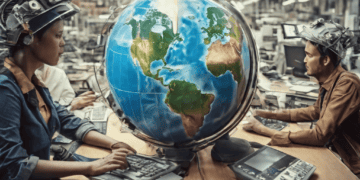The Deputy Director-General of the World Trade Organization (WTO), Angela Ellard, discussed the evolving landscape of international trade and its relationship with technological advancements in a keynote speech at the 2023 Annual WTO Conference. This event was organized by the British Institute of International and Comparative Law. Ellard emphasized the growing importance of services, particularly digitally-delivered services, in the global economy and how new technologies have contributed to trade facilitation and enhanced transparency. She also provided insights into the latest developments in negotiations aimed at updating WTO rules.
Deputy Director-General Angela Ellard began her speech by acknowledging the British Institute of International and Comparative Law for hosting the conference, commending the institute’s efforts in research, teaching, and publishing on various legal and policy matters, including international trade and WTO-related issues. She also praised Gabrielle Marceau for her leadership in organizing the conference over the years.
Ellard highlighted the profound impact of technological developments on international trade, emphasizing the complexity of this transformation and its implications for national and international policy-making.
- The Role of Services in International Trade: Ellard pointed out that global services exports reached a record $7.2 trillion in 2022, marking a 17% increase in just one year. She projected that services’ share in world trade could reach one-third by 2040, highlighting the significant potential for further growth. The expansion of digitally-delivered services, which have tripled since 2005 and accelerated during the pandemic, played a pivotal role in this growth.
The data contradicted claims of de-globalization, emphasizing that the nature of globalization is evolving, with trade in services playing a crucial part. Ellard highlighted the interplay between trade in goods and services, with advances in tangible goods such as computers and telecommunications infrastructure reinforcing the growth of intangible services.
- Technology Tools for Trade Facilitation: Ellard discussed the potential of technology tools like Artificial Intelligence, blockchain, and customs e-declarations to streamline cross-border flows of goods. These tools have simplified customs clearance processes, addressing challenges related to human resources, supply chain vulnerabilities, and online sales risks. The Deputy Director-General underlined the importance of harmonizing digital regulations with international standards to prevent digital regulatory fragmentation.
- Technology Enhancing Transparency: The speech also addressed the use of technology within the WTO to enhance transparency, reduce trade frictions, and modernize working practices. The E-Ping platform, for instance, enables WTO Members to submit notifications of upcoming regulatory changes. Additionally, digital technologies are utilized to modernize the working practices of committees and councils within the organization, increasing efficiency and trade issue resolution.
- Technology’s Role in Inclusivity: Ellard emphasized the potential of technology to include developing countries, least developed countries, Micro, Small and Medium-Sized Enterprises (MSMEs), women, and youth in global trade. Digitally delivered services can serve as a lifeline for countries affected by disasters or conflict and with limited infrastructure access.
However, to fully harness the potential of technology, it is crucial to establish an enabling ecosystem that includes connectivity, skills, logistics, payment systems, and supportive policies. Addressing barriers to trade in services, such as cross-border payments, data flows, commercial presence requirements, foreign investment restrictions, and mobility of service providers, is vital to promote inclusive and sustainable development.
- WTO’s Role in Adapting to Technological Changes: The Deputy Director-General emphasized the need for the WTO to adapt to the changing landscape of global trade, citing that the current WTO framework was established in 1995, which is outdated in technology terms. She discussed ongoing work within the WTO, including the extension of the moratorium on customs duties on electronic transmissions, plurilateral initiatives on services, e-commerce, and investment facilitation, and discussions on expanding the Information Technology Agreement (ITA).
- Technology and the Green Transition: Ellard highlighted the role of technology in achieving climate goals and emphasized that open trade can help provide affordable access to advanced technologies required for transitioning to a low-carbon economy. She discussed the potential for reducing barriers to trade in environmental goods and services, which could lead to a significant reduction in carbon emissions.
- Technology and Trade Frictions: The speech concluded by acknowledging the role of technology in causing trade tensions, citing the increased importance of technology in foreign policy, national security, and geopolitical conflicts. It was highlighted that isolationism could lead to reduced supply chain resilience and increased vulnerabilities.
Deputy Director-General Angela Ellard underscored the importance of international cooperation and diverse supply chains in addressing these challenges, emphasizing the WTO’s role in shaping the future of globalization with a focus on services and digitization.
Your source for supply chain report news updates: The Supply Chain Report. For international trade insights and tools, head to ADAMftd.com.
#WTO #AngelaEllard #InternationalTrade #DigitalTrade #TechInTrade #TradeFacilitation #BlockchainInTrade #ArtificialIntelligence #WTOConference #GlobalEconomy #DigitallyDeliveredServices #TradeNegotiations #Globalization #TechForTransparency #Ecommerce #CrossBorderTrade #WTOReform #SupplyChainInnovation #TechForInclusivity #GlobalTrade #GreenTransition #TradeFrictions #GlobalCooperation #InternationalLaw #TradePolicy #DigitalRegulation
















